Ocean Essence and Bone Health

Bones serve as the fundamental framework of our bodies, facilitating all our movements, and also safeguarding our organs from harm. As we age beyond 40, our bones gradually lose about 1% of their density each year. This decline, though subtle, is significant and affects our overall bone strength over time. This loss of bone density leads to an increased risk of fractures, osteoporosis, and other bone-related health issues.
Caught up in the whirlwind of daily routines, our bone health often slips through the cracks. From the frantic rush of morning commutes to the fatigue of long workdays, and the exhaustion of evening returns, there's little time to prioritize a balanced diet, let alone consider the needs of our bones. This is where Ocean Essence comes in.
Ocean Essence was created to bridge the gap between busy lifestyles and optimal bone health. Our carefully crafted Total Bone Support supplement was designed to provide the essential nutrients your bones need, even when your schedule is packed. In this blog, we'll delve into how the Ocean Essence formula is research backed to enhance bone density, and why it stands out among other bone health supplements.
The Risks
Lower bone density poses significant risks to overall health and quality of life, especially as we age. This decline, is often linked to osteopenia or osteoporosis, and can have profound consequences if not addressed. Reduced density heightens the risk of fractures and injuries, impacting physical health, mobility, and independence. Additionally, it can lead to chronic pain, anxiety, and decreased social engagement. Taking the proper steps to promote bone health, such as exercise and proper nutrition, is essential for maintaining overall well-being as we age.
Increased Risk of Fractures:
Perhaps the most immediate and tangible risk of lower bone density is the heightened susceptibility to fractures. Weakened bones are more prone to breakage, even with minimal trauma or impact. Individuals with osteoporosis are at a significantly higher risk of experiencing fractures, particularly in the hip, spine, and wrist, which can lead to chronic pain, disability, and even mortality (1).
Loss of Independence
Fractures resulting from low bone density can severely impact mobility and independence. Research indicates that hip fractures, in particular, are associated with a significant decline in functional abilities and often require prolonged rehabilitation or assistance with activities of daily living. This loss of independence can lead to increased dependence on caregivers and diminished quality of life (2).
Chronic Pain and Disability
Osteoporotic fractures are often accompanied by chronic pain and disability, further reducing overall well-being. Studies have shown that individuals with lower bone density are more likely to experience persistent pain and limitations in physical functioning. This can result in decreased participation in social activities, increased healthcare utilization, and higher rates of depression and anxiety (3).
Healthcare Burden and Economic Impact
The healthcare burden associated with osteoporotic fractures is substantial, both for individuals and healthcare systems. The direct medical costs of osteoporosis-related fractures in the United States alone are estimated to exceed $19 billion annually. This includes expenses related to hospitalizations, surgeries, medications, and rehabilitation services. Furthermore, the indirect costs, such as lost productivity and caregiver burden, further amplify the economic impact of lower bone density (4).
Mortality Risk
Lower bone density is also associated with an increased risk of mortality, particularly following hip fractures. Individuals aged 50 and older who sustain a hip fracture have a significantly higher risk of mortality in the years following the injury compared to their counterparts without fractures. This underscores the importance of addressing bone health to prolong life expectancy and improve overall outcomes (5).
Thinking of Trying Ocean Essence?
Ocean Essence provides a healthy balance of bone nourishing minerals and vitamins including Calcium, Magnesium, Vitamin D, and Vitamin K.
Ocean Essence key Ingredients and Their Role in bone health
When it comes to bolstering bone health, the right nutrients can make all the difference. Ocean Essence’s plant-based calcium supplement taps into the power of nature with a blend of ingredients specifically chosen for their bone-supporting benefits. Among these, Aquamin stands out. This unique, multi-mineral complex derived from red marine algae, celebrated for its high bioavailability and rich mineral content. Studies have shown that Aquamin™ not only supports bone density but also contributes to the overall health of the body, making it a cornerstone of Ocean Essence's effectiveness.
Calcium & Magnesium from Red Marine Algae (Aquamin)
Ocean Essence's calcium sourced from red marine algae offers a unique plant-based alternative for bone health. This ocean-derived calcium boasts superior absorption, ensuring your body efficiently absorbs the calcium it needs to maintain strong bones. Studies indicate that natural sources like red marine algae provide bioavailable calcium, which supports bone health and may help maintain bone strength over time.
Bioavailability of Minerals: Research has found that minerals derived from natural sources like red marine algae are more bioavailable and better utilized by the body compared to synthetic sources. This supports the claim of red marine algae provides a better source bioavailable calcium and magnesium (6).
Aquamin's Effect on Bone Health: Research conducted on animal models, particularly rats, has shown that supplementation with Aquamin™ can support bone health and may help maintain bone strength. These findings suggest the potential for Aquamin™ to promote bone health in humans as well (7).
Aquamin Compared to Traditional Calcium: Another study conducted on bone health revealed that supplementation with Aquamin™ resulted in less degradation of trabecular bone compared to calcium carbonate or (traditional calcium). This observation suggests a potential superiority of Aquamin™ in preserving bone architecture, emphasizing its relevance in promoting and maintaining optimal bone health (8).
The Magnesium in Ocean Essence complements the benefits of calcium and is also from red marine algae (Aquamin). Magnesium is needed for over 300 enzyme systems, it enhances calcium absorption and activates vitamin D, which is crucial for bone strength. From helping build proteins to managing muscle and nerve functions, and even keeping our blood sugar and pressure in check, magnesium does it all.
Vitamin D
Vitamin D's role in maintaining bone health is to facilitate the absorption of calcium, the primary constituent of bone tissue. Research has highlighted the significant impact of vitamin D on bone mineral density and fracture risk reduction. Insufficient vitamin D levels have been linked to conditions like osteomalacia in adults and rickets in children, characterized by weakened and soft bones due to impaired calcium utilization. By enabling proper calcium metabolism, vitamin D supports bone health and helps prevent the onset of these debilitating conditions, emphasizing its essential role in skeletal well-being (9).
Vitamin K2
Vitamin K2 regulates calcium metabolism, facilitating its proper utilization in bone mineralization. Research confirms a positive association with bone mineral density, emphasizing its role in bone health. By activating proteins that transport calcium to bones and teeth, it prevents calcium deposition in soft tissues, reducing the risk of calcification and supporting cardiovascular health. Insufficient levels of vitamin K2 increase fracture risk and impair bone mineralization. Adequate intake or supplementation promotes optimal bone health, enhancing strength and resilience against fractures (10).
Get Your Ocean Essence Today
Bones are complex, we make it simple.
Enhancing Bone Health Naturally With Ocean Essence
The Ocean Essence synergy
The Ocean Essence synergy is the result of extensive research and meticulous selection of ingredients, all aimed at providing unparalleled support for optimal bone health. Each ingredient has been carefully chosen based on substantial scientific evidence demonstrating its efficacy in promoting bone health.
Aquamin provides a highly bioavailable source of calcium and magnesium, two essential minerals that support the maintenance of normal bone density. Vitamin D, often called the "sunshine vitamin," helps with calcium absorption and supports healthy bone mineralization. Vitamin C plays a role in collagen production, which is important for the structure and maintenance of bone tissue.
Vitamin K2 helps guide calcium to the bones and away from soft tissues, supporting proper calcium utilization. Trace minerals like boron, silica, manganese, and copper contribute to bone health by supporting metabolic functions such as collagen formation, enzyme activity, and mineralization. Together, these nutrients offer comprehensive nutritional support for strong, healthy bones.

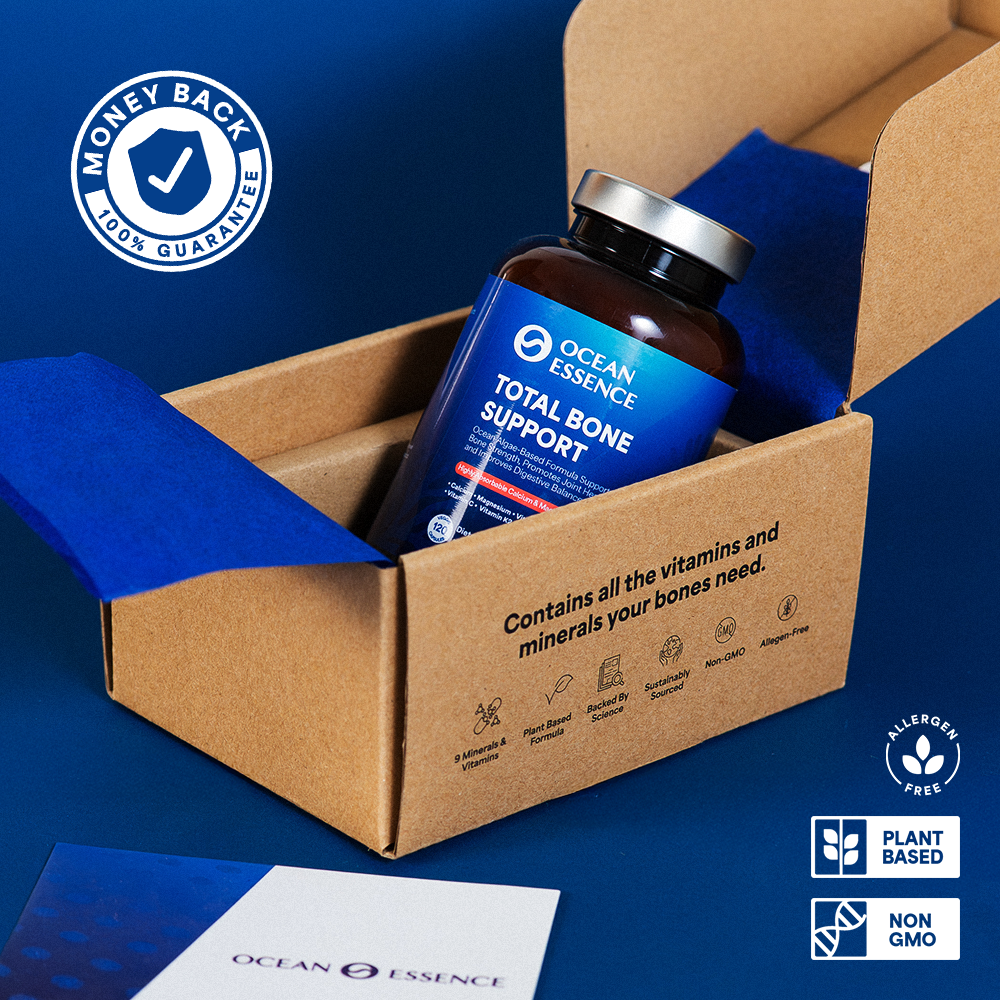

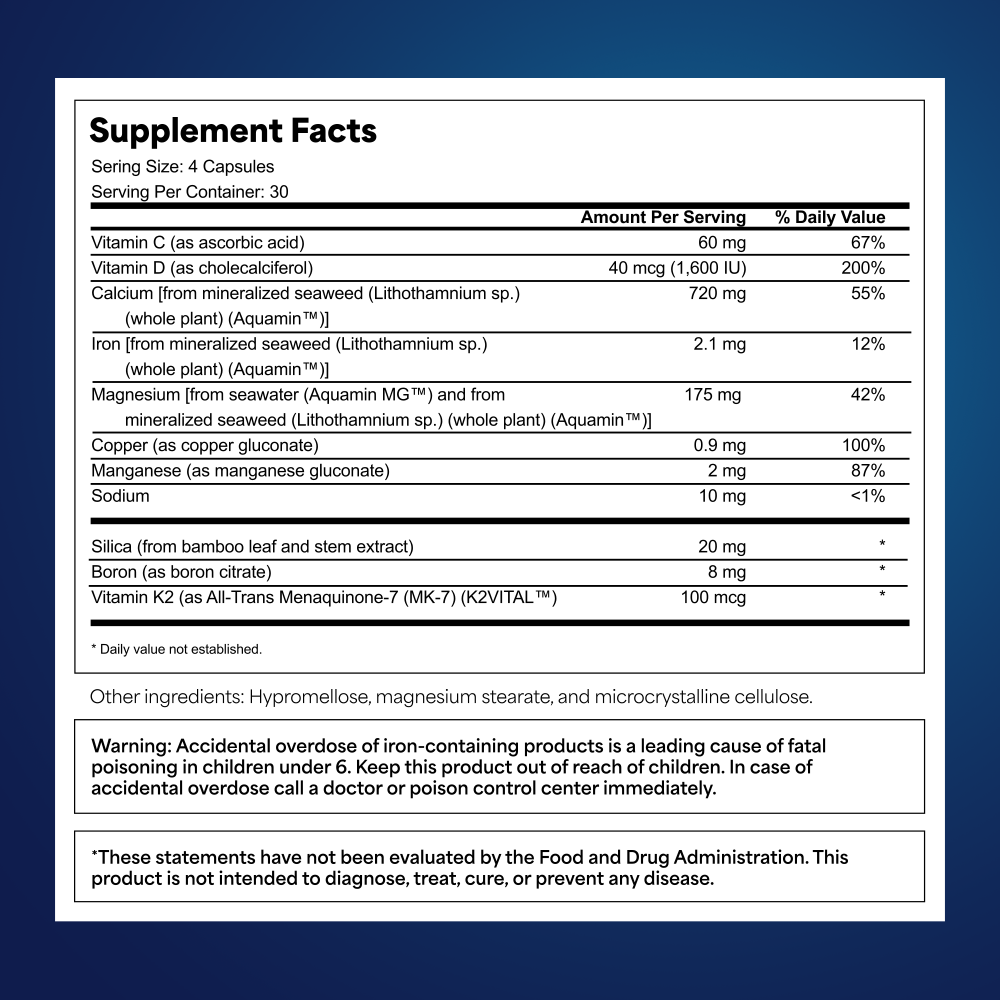
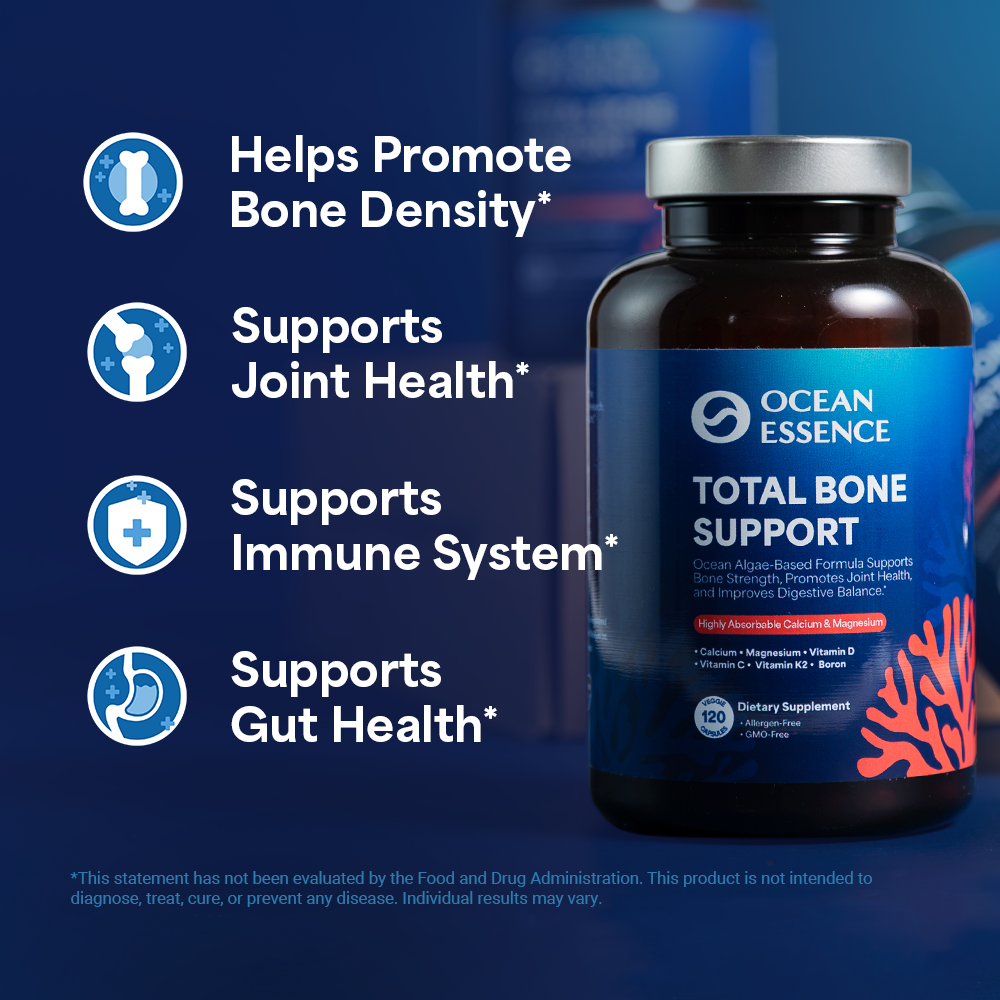
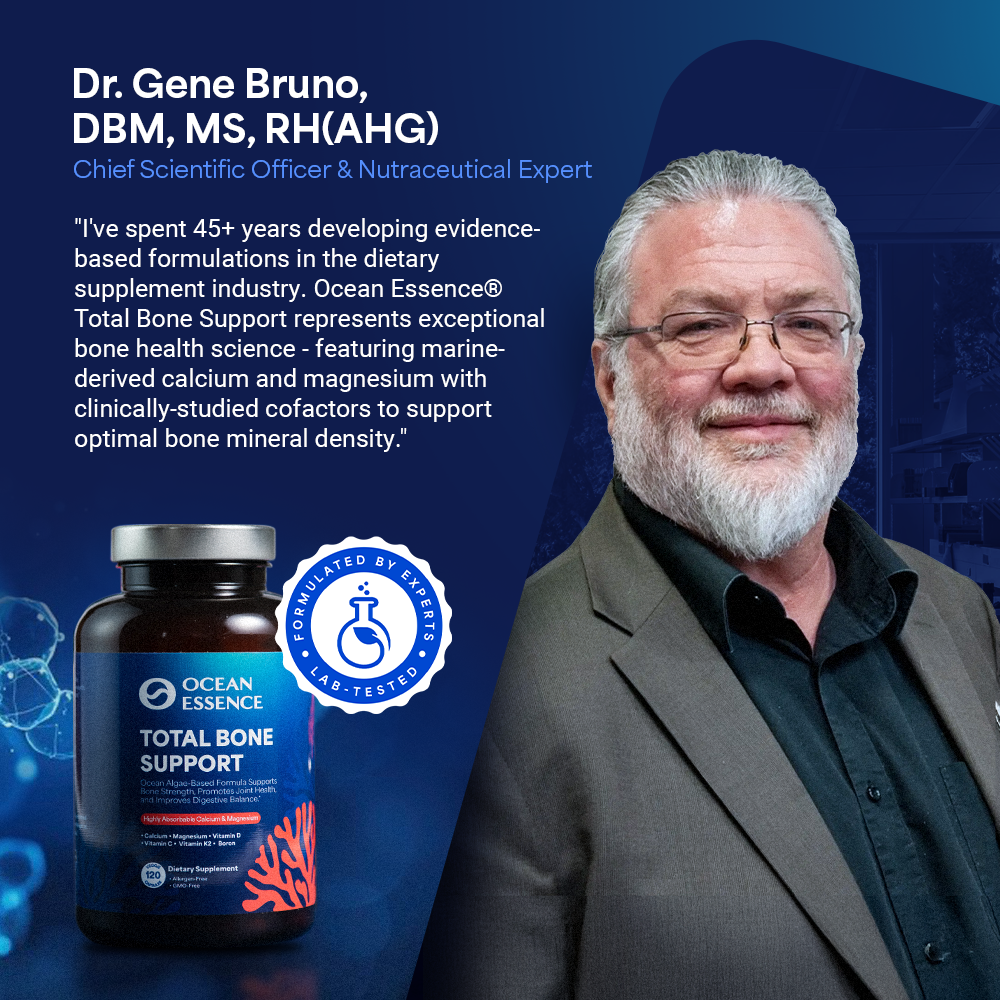
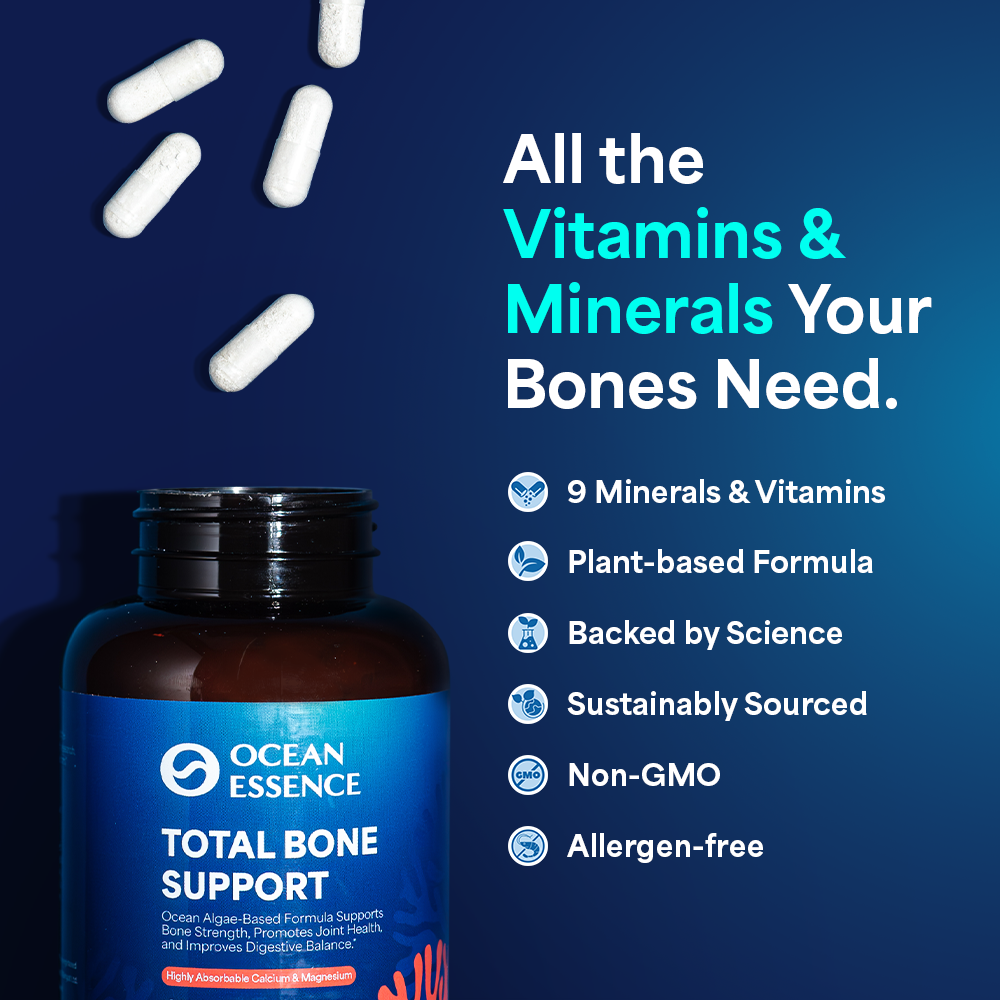
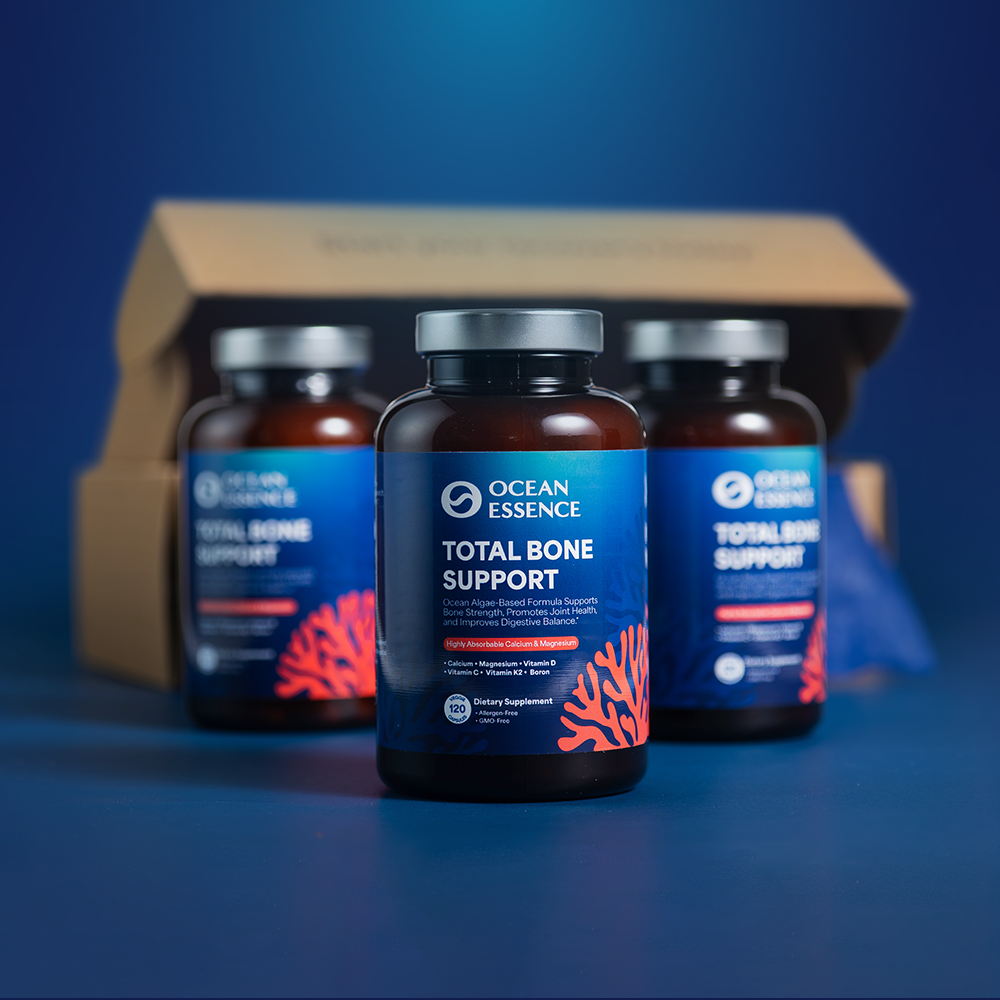
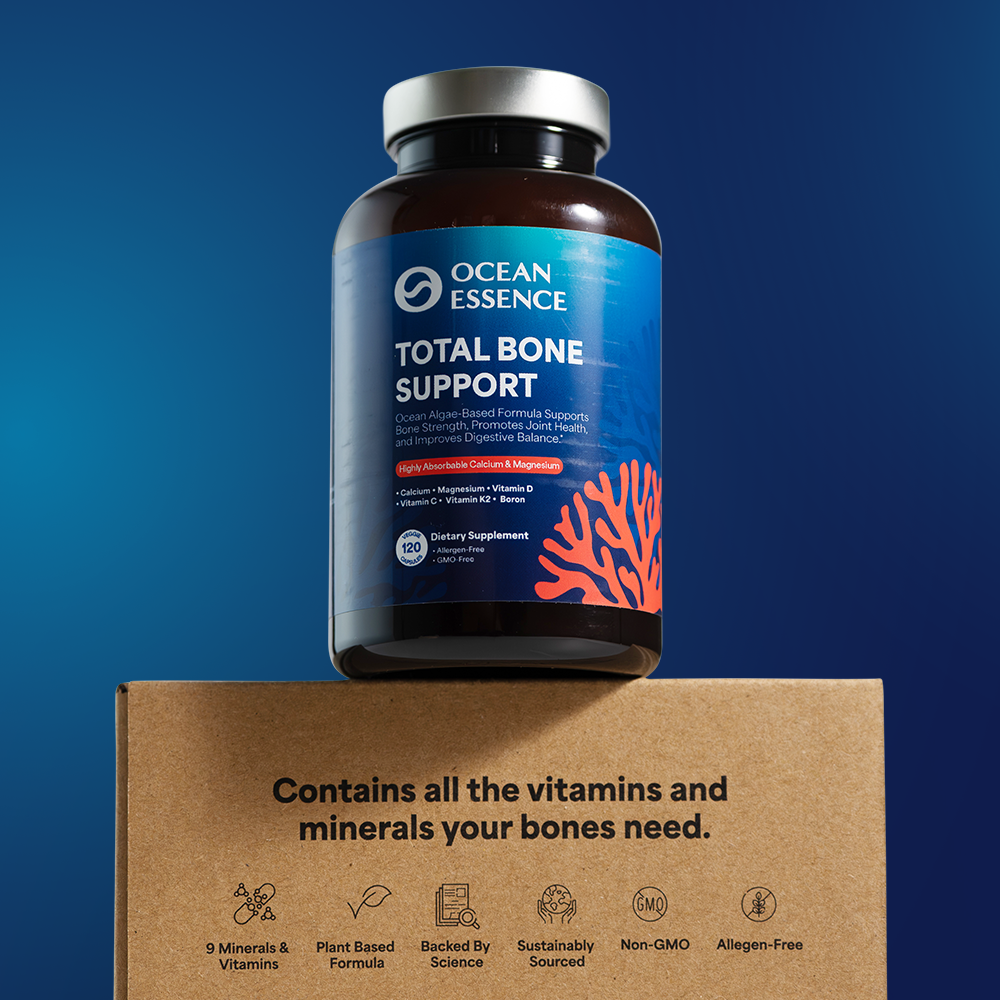
Ocean Essence - Total Bone Support
Support Bone Density*
Product Description:
Ocean Essence - Total Bone Support is an algae-based calcium supplement rich in key vitamins and minerals your bones need. Helps promote bone density.*
Supplement Facts:

Select Frequency:
Subscribe & Save 15%
Amount:
-
-
-
-
Subscription:
365 Day Money-Back Guarantee
Not satisfied? Get a full refund.*

Manufactured In The USA
Crafted in the USA for superior quality and reliability.

2-5 Day Shipping & Delivery With USPS ground
Experience Fast and Reliable Shipping Nationwide
REVIEWS
References:
(1) Melton, L. J. (2003). Adverse outcomes of osteoporotic fractures in the general population. Journal of Bone and Mineral Research, 18(6), 1139–1141. https://doi.org/10.1359/jbmr.2003.18.6.1139
(2) Dyer, S. M., Crotty, M., Fairhall, N., Magaziner, J., Beaupre, L. A., Cameron, I. D., & Sherrington, C. (2016). A critical review of the long-term disability outcomes following hip fracture. BMC Geriatrics, 16(1), 158–158. https://doi.org/10.1186/s12877-016-0332-0
(3) Kerr, C., Bottomley, C., Shingler, S., Giangregorio, L., De Freitas, H. M., Patel, C., Randall, S., & Gold, D. T. (2017). The importance of physical function to people with osteoporosis. Osteoporosis International, 28, 1597-1607. https://doi.org/10.1007/s00198-017-3911-9
(4) Burge, R., Dawson‐Hughes, B., Solomon, D. H., Wong, J. B., King, A., & Tosteson, A. (2007). Incidence and economic burden of osteoporosis‐related fractures in the United States, 2005–2025. Journal of Bone and Mineral Research, 22(3), 465–475. https://doi.org/10.1359/jbmr.061113
(5) Diamantopoulos, A. P., Hoff, M., Hochberg, M., & Haugeberg, G. (2013). Predictors of short-and long-term mortality in males and females with hip fracture-a prospective observational cohort study. PloS one, 8(10), e78169. - https://doi.org/10.1371/journal.pone.0078169
(6) Frestedt, J. L., Kuskowski, M. A., & Zenk, J. L. (2009). A natural seaweed derived mineral supplement (Aquamin F) for knee osteoarthritis: a randomised, placebo controlled pilot study. Nutrition journal, 8, 1-8. - https://doi.org/10.1186/1475-2891-8-7
(7) Bae, Y. J., Bu, S. Y., Kim, J. Y., Yeon, J. Y., Sohn, E. W., Jang, K. H., ... & Kim, M. H. (2011). Magnesium supplementation through seaweed calcium extract rather than synthetic magnesium oxide improves femur bone mineral density and strength in ovariectomized rats. Biological trace element research, 144, 992-1002. - https://doi.org/10.1007/s12011-011-9073-2
(8) Aslam, M. N., Kreider, J. M., Paruchuri, T., Bhagavathula, N., DaSilva, M., Zernicke, R. F., ... & Varani, J. (2010). A mineral-rich extract from the red marine algae Lithothamnion calcareum preserves bone structure and function in female mice on a Western-style diet. Calcified tissue international, 86, 313-324. - https://doi.org/10.1007/s00223-010-9340-9
(9) Mendes, M. M., Hart, K. H., Botelho, P. B., & Lanham-New, S. A. (2018). Vitamin D deficiency negatively affects total bone mineral density in adult Brazilian women living in Southern England: baseline results of the D-SOL study. Proceedings of the Nutrition Society, 77(OCE4), E242. - https://doi.org/10.1017/S0029665118002483
(10) Rondanelli, M., Faliva, M. A., Infantino, V., Gasparri, C., Iannello, G., Perna, S., Riva, A., Petrangolini, G., Tartara, A., & Peroni, G. (2021). Copper as Dietary Supplement for Bone Metabolism: A Review. Nutrients, 13(7). https://doi.org/10.3390/nu13072246
(11) Yamaguchi, M., & Weitzmann, M. N. (2011). Vitamin K2 stimulates osteoblastogenesis and suppresses osteoclastogenesis by suppressing NF-κB activation. International journal of molecular medicine, 27(1), 3-14. - https://doi.org/10.3892/ijmm.2010.562

